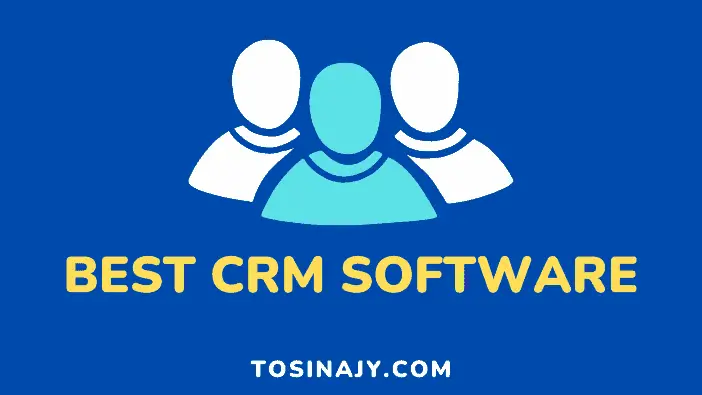With the rate at which competition for leads and sales is rising, sales teams and business owners need a more fitting way to trail customers through every stage of the buyer journey. At this junction, the CRM software comes into play.
The aim of the customer relationship management (CRM) software is to support computer relationships with stakeholders across different channels, making sure that customers have an excellent experience and eventually guide them down the sales funnel.
With CRM tools, companies are able to manage interactions within a system using marketing automation, email marketing, and lead nurturing.
By sending individualized messages to the right prospects at the right time, these tools also assist sales and marketing teams to enhance their database marketing.
To ease your decision-making process, I have ranked and reviewed the best CRM software based on features, support, pricing, integrations, marketing tools, sales capabilities, and more.
Let’s get started.
What is the Best CRM Software?
Having used a lot of different CRM software from numerous tech companies, here are my top picks for the best CRM software to try out now.
1. HubSpotCRM
Best Free CRM with Marketing Tools
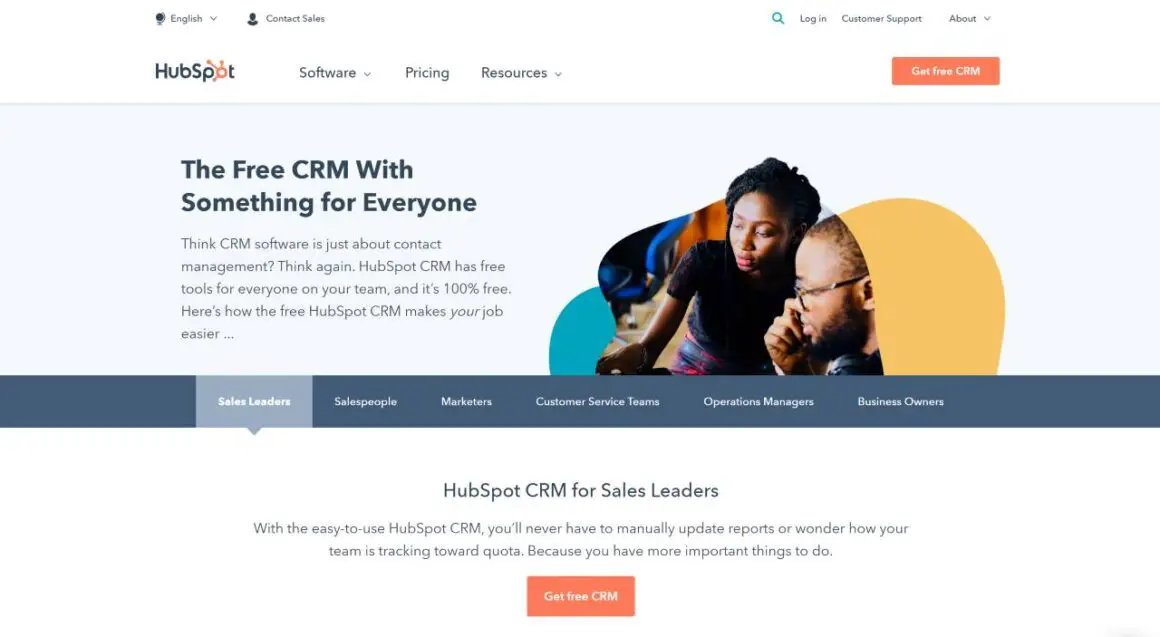
HubSpot CRM is a full-featured marketing suite, with its CRM software being their most famous offering.
Due to its great features and time-saving tools, HubSpot CRM is just superb for sales professionals. It’s also a powerful option for marketing teams with the ability to capture, track, and grow leads within a database system.
They offer a full free version of their software, with the option to upgrade and gain access to their entire suite of marketing tools.
Key Features
- Email and Lead Nurturing – You can send free, individualized emails, and track your results with built-in analytics reports.
- Organization and Management of Contact – Your email inbox can be connected to their CRM and you can automatically sync, organize and manage your contacts in one place.
- Over 300 Integrations – You can easily connect your existing tech stack to get more functionality out of the tools you’re already paying for.
- Live Chat and Chatbots – This helps customers faster with support tickets, productivity tools, and instant chat capabilities.
- Sales Pipeline Data – Sales leaders can view all their sales pipeline with views into sales activity and individual performance.
Pros
- A free plan that you can be upgraded at will.
- Ad management tools to track ROI across paid campaigns on Google, LinkedIn, Facebook, Instagram, and so on.
- Free email marketing and list segmentation.
- A team email and conversations inbox for access to all messages in one place.
- A super form builder to capture lead information.
- Integrated with their sales and marketing suites, which include live chat, landing pages, email marketing, ad management, document management, and more.
Pricing Plans
HubSpot CRM has a free plan that offers tons of nice features to start with. You can then choose to upgrade to one of their paid plans:
- Starter ($40/month): All features of the free plan, plus additional forms, 10 reporting dashboards, up to 50 email list segmentation, $1,000 in ad management, and limited conversational bots.
- Professional ($800/month): All features of free and starter, 25 reporting dashboards, plus 2,000 email list segmentation, $10,000 in ad management, and full chatbot features. This plan also opens up extra features like content strategies, phone support, an SSL certificate, and a blog.
- Enterprise ($3,200/month): All features outlined above (with higher-tier options), plus webhooks, user roles, event-based segmentation, API calls, predictive lead scoring, multi-touch revenue attribution, and more.
2. ZohoCRM
Best CRM For Small/Medium Business (SMBs)
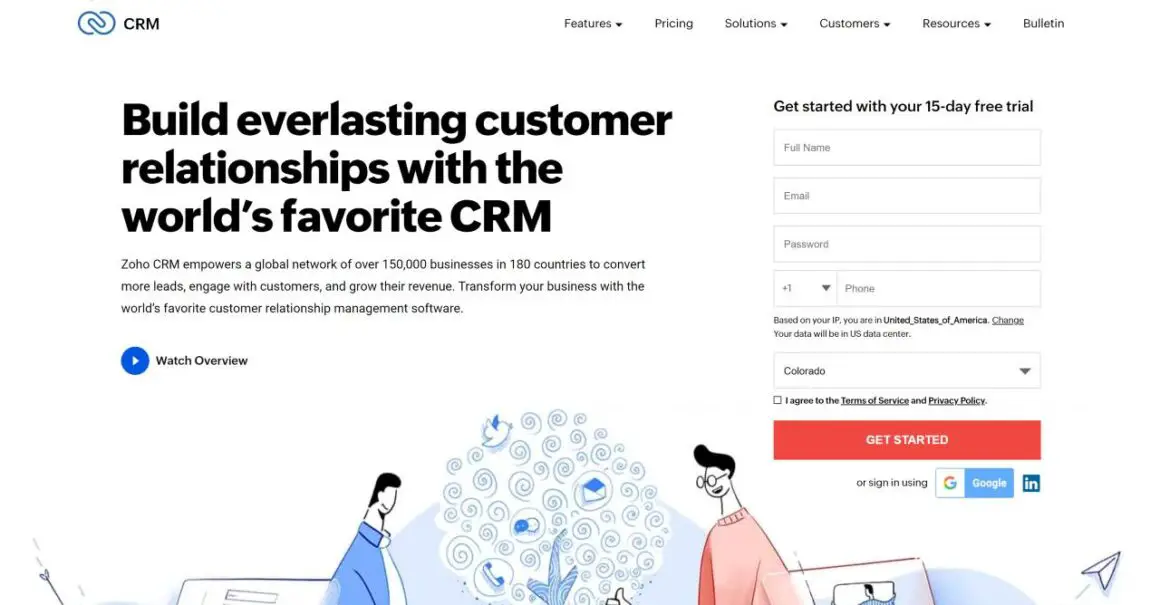
With Zoho CRM, you can get an all-round view of your business, track essential sales and marketing opportunities, and increase conversion rates. With over 150,000 customers worldwide, Zoho CRM is one of the most popular tools on this list.
Key Features
- Advanced CRM Analytics – Integrates your data and obtain actionable insights.
- AI-Powered Sales Assistant – Zoho assists sales teams and representatives to make decisions based on customer profile and detect anomalies.
- Sales Enablement – Helps you generate price quotes and access sales scripts.
- Process management – Enables the team to map out every step of the sales process with sales builder and processing rules.
- Performance Management – With features like reporting, gamification, sales forecasting, and territory management, you can make the best out of your small-business expenditures.
Pros
- 15-day free trial period.
- Has a free plan for up to 3 users.
- Highly customizable.
- Ensures data security, integrity, and regulatory compliance.
- Omnichannel customer support via phone, email, social media, and live chat.
- Provides high-level automation.
- Offered in multiple languages.
- More than 100 third party integrations, including Zapier, LinkedIn, email integrations like Google and Outlook, and more.
- Highly scalable.
- Offers a mobile version (for paid plans).
- Provides holistic calendar management.
- Offers data import/export.
- Predictive sales feature to help with data enrichment, email sentiment analysis, and more.
Pricing plans
All three paid plans, the ‘Standard,’ ‘Professional,’ and ‘Enterprise’ cost $12, $20, and $35 respectively per user per month (billed annually). Zoho CRM also offers a freemium plan for up to 3 users.
3. Freshsales
Smartest Sales Features
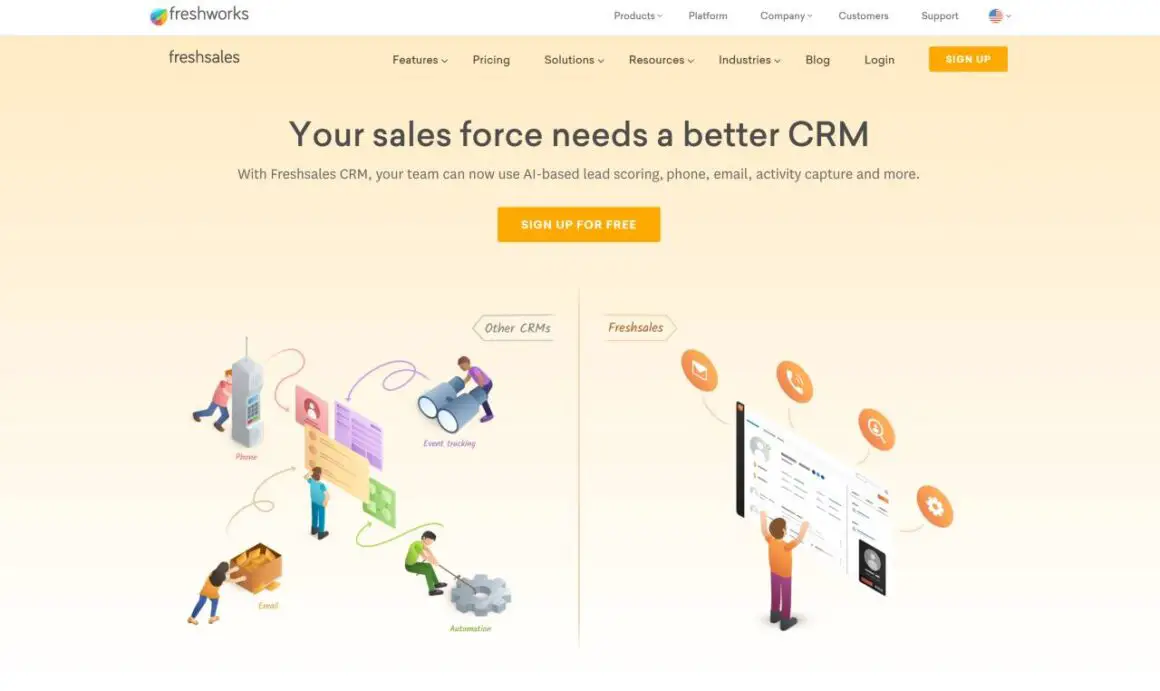
Freshsales is an AI-based CRM for lead scoring, email activity, email capture, and so on. One of its most prominent features is that it provides an all-round view of your business.
Key Features
- Lead Management – Offers solutions to convert prospective leads into customers.
- Deal Management – Gives you a detailed picture of where the deal is placed in the sales funnel. Also helps you manage and organize every step in the funnel and increase your chances of conversion.
- Auto Lead Assignment – The CRM allows specially chosen leads to select salespeople automatically.
- Tracking and Lead Scoring – With an in-built AI-feature, you can rank and score leads, and identify the ones most likely to make a purchase.
- Smartforms (web-to-lead) – When a person fills up the web-form on your website, they automatically become a lead and are added to your database.
Pros
- 21-day free trial period.
- Highly flexible.
- Provides intelligent high-level automation workflows.
- Behavior-based lead segmentation.
- Extensive range of integrations, including MailChimp, Zapier, Piesync, Segment, Calendar, and more.
- Event tracking (tracks previous communication to plan the future approach).
- RESTful APIs to help you read, modify, add, and delete data from the help-desk.
- Advanced lead scoring based on features and behavior.
- Sends out personalized welcome and voicemail messages.
- GDPR-compliant.
- Excellent customer support via phone and email.
- Known as one of the best mobile CRMs with a mobile app.
Pricing plans
Freshsales offers four plans, starting from $12 up to $79 per user per month (when billed annually).
4. Salesforce
Best Enterprise CRM
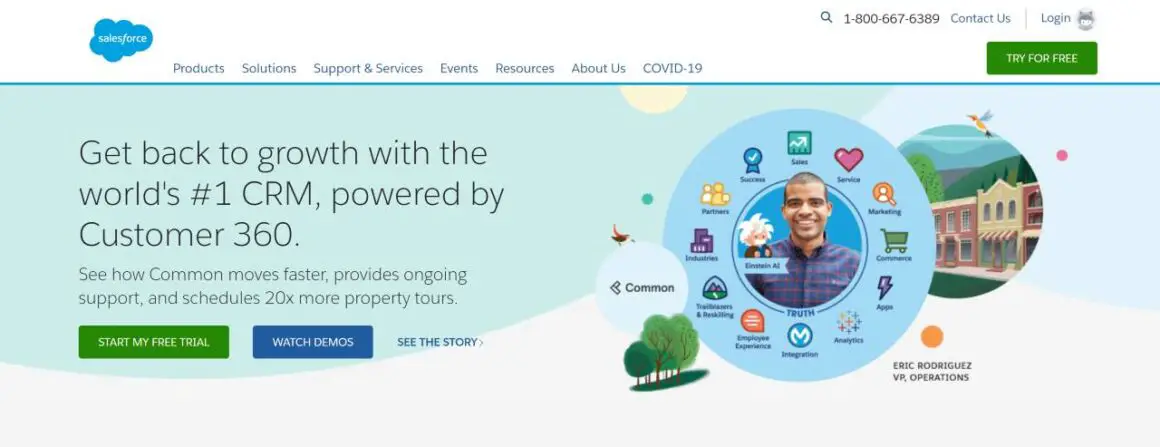
Salesforce is one of the most popular names on this list and has over a million users globally. It’s a cloud-based CRM software that caters to all the branches of a business, including sales, service, marketing, analytics, and more.
Key features
- Opportunity Management – You can close more deals by identifying the ideal opportunities with the ‘opportunity management’ module.
- Contact Management – With this module, you can track specifics like customer history, communications, and social media mentions.
- Visual Workflow – Using this, you can drag, drop, share, and track files and updates.
- Sales Performance Management – Set sales goals and update targets for the best sales performance.
- First Feed Feature – This allows you to see what you want to see first (based on your settings).
Pros
- 30-day free trial period.
- Cloud-hosted (faster and inexpensive).
- 24/7 customer support available via phone, email, and tickets.
- High-level automation and personalization (provide great social experience).
- Offer enterprise territory management, a sales CRM, and management of social networks.
- Compatible with Linux, Mac, Windows, Android.
- Multi-language and multi-currency customer support.
- Wide range of email templates to choose from.
- Open API (therefore highly customizable).
- In-built Einstein Lead Scoring.
- Provides partner communities.
- Lead management with sales force automation and business intelligence.
- A large number of third-party integrations (LeadExec, Ambassador, Zuora, Zendesk, among others).
- Compatible with all devices, including mobile phones.
- Mass emailing option to help you save time and effort.
- In-built process builder and lead generation tools.
Cons
- Can’t be used by companies who want on-premise deployment.
- Live chat support isn’t available.
Pricing Plans
Salesforce offers an array of products; therefore, the prices may vary. However, the subscription plans start at $25 per user per month, and the most expensive plan costs $1,250 per user per month (both billed annually). You can also get in touch with them for a customized plan.
5. Nimble
Best Simple CRM
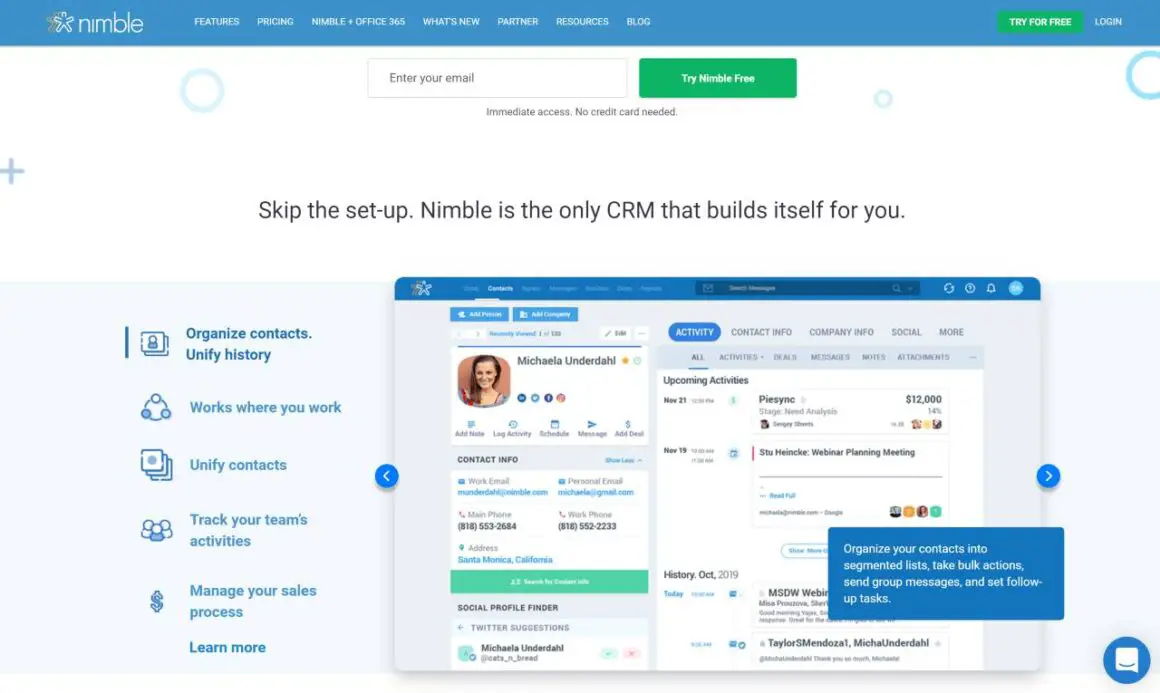
The Nimble is an excellent, though simple CRM software tool, that works within the G-Suite inbox or Office 365. It allows you to update contacts, access company & contact insights easily, and manage deals from within your workflow, among other outstanding features.
Key features
- Reminder feature – never miss out on an opportunity with pre-scheduled reminder features.
- Live Profiles – actionable, accessible contact records to quickly locate contact information and interaction history.
- Relationship Management – helps you automatically combine and collect social media connections, communications, inboxes, and calendar appointments.
- Segmentation – helps you stay organized by segmenting your contacts into lists to take various actions.
- Pipeline management – always stay on top of every stage of the sales funnel by the visual representation of pipelines.
Pros
- 14-day free trial.
- Compatible with mobile phones.
- Has a ‘group message’ feature.
- Sends out group emails to help you engage your audience at a large scale.
- Email tracking to engage customers/leads more effectively.
- Offers a redesigned smart contacts app (enhanced widget to support, calendars, tasks, deals, and more).
- Highly scalable and customizable.
- Extensive range of third-party integrations, such as Gmail, Outlook, HubSpot, Mailchimp, and more.
- The prospector tool allows you to visit a website and get professional details about people who aren’t listed on the website.
- Extensive task management to create and assign tasks to different team members.
- Ensures data security, integrity, and GDPR compliance.
Cons
- Doesn’t have a free plan.
- Only a single plan is available.
- Doesn’t one with the auto-responder feature.
- Many integrations need a ‘sync’ tool to function properly.
Pricing plans
There is only one plan available. The price is $25 per month (billed monthly) and $19 per month (billed annually).
6. Pipedrive
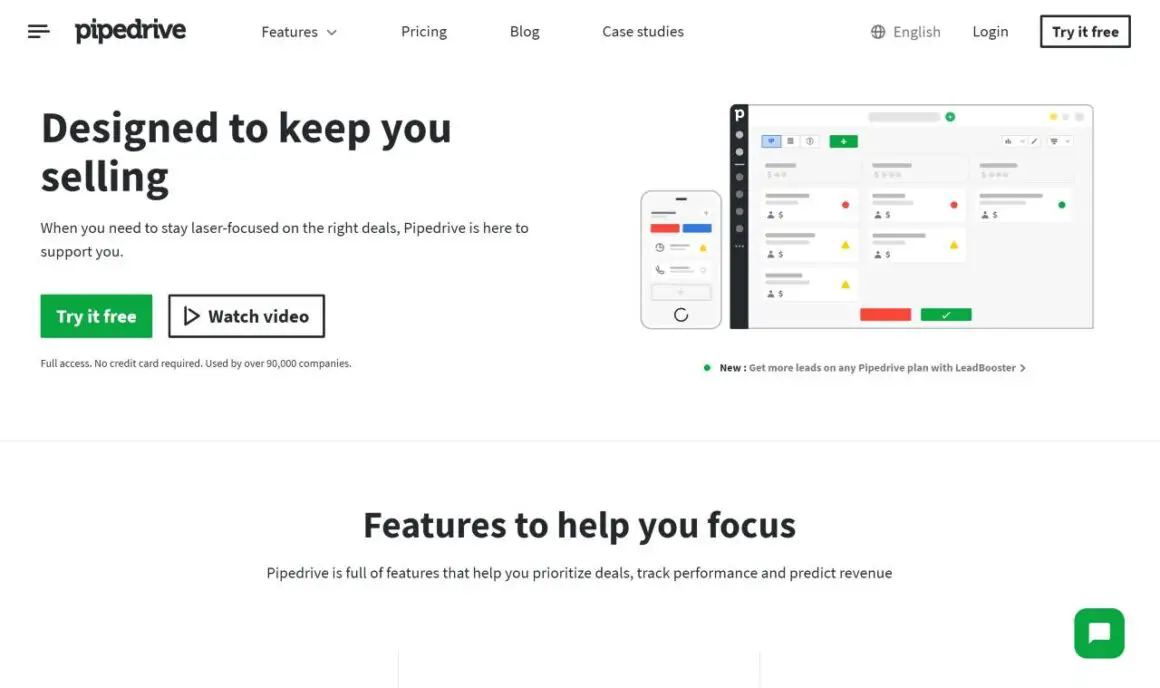
Pipedrive is a sales-focused CRM that uses AI to automate recurring tasks and manage leads and sales. They currently support over 90,000 customers and over $24 billion in deals have passed via their platform.
Key features
- Mobile Apps – You can use Pipedrive from your mobile device and integrate your smartphone with other sales apps to multiply sales.
- Lead Management – Track leads and sales from forms, chatbots, and more on a 24/7 basis.
- Communication Tracking – A full contact history tracks calls, chats, emails, and so on and allows you to set your schedule in real-time.
- Visual Sales Pipelines – You can organize your pipeline and create custom stages (hot, warm, cold) by team member or rep.
Pros
- Can easily add deals, values, win probabilities, and close dates.
- There’s no limit to the custom fields that collect pieces of customer information.
- Custom reports can track revenue estimates and recurring revenue.
- Activity reports can track demos, individual sales calls, emails, and events.
- Lead source data reports tell you the source of your leads (organic, direct, SEM, social, outbound sales, etc.)
- “Sales Assistant” creates performance tips and automation recommendations to save you time.
Pricing
Pipedrive offers four paid plans: Essential, Advanced, Professional, and Enterprise. These plans range from $12.50 per user per month to $99 per user per month.
7. NetHuntCRM
Best CRM for gmail
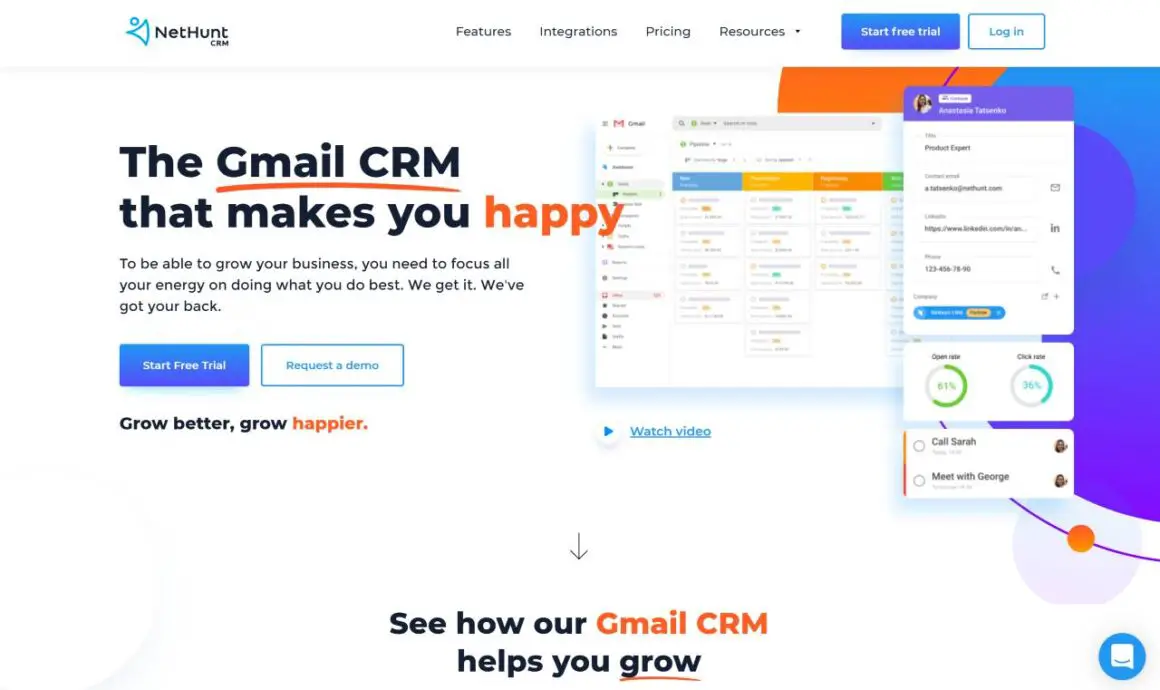
NetHunt CRM works collaboratively with your Google account and all other applications. It brings to you all the familiarity of the G-suite, along with all the CRM functionalities.
Key features
- Pipeline Management – Picks the right deals and activities to select and follow-up on a daily or weekly basis and see how close you are to closing a deal.
- Customer Relationship Management – Takes care of managing and following up on leads, create records, taking care of existing customers, and answers questions.
- Leads Tracking – Ensure timely follow-up and status of leads so that you can track and address them effectively.
- Sales Tracking – Helps you track sales across multiple channels, monitor the KPIs of the sales team, and capture information about leads and customers.
- Sales Cycle Management – Go after leads more effectively, find out the status of the sales cycle, and optimize efforts.
Pros
- 14-day free trial period.
- User-friendly and intuitive interface.
- Fully integrated with Gmail.
- Compatible with mobile devices.
- Filter, sort, and save data the way you need.
- Highly customizable and scalable.
- Sends out personalized, bulk emails.
- Capture potential leads in one click.
- Cloud-hosted (inexpensive and easy setup).
- Multi-language platform.
- Email, phone, and live chat customer support available.
- Data import and export is effortless.
- Extensively integrated with third-party applications (LinkedIn, Mailchimp, Twitter, Facebook, and more).
Cons
- No free plan available.
- Incompatible with Linux.
- Ticket customer support not available.
- On-premise deployment isn’t available.
Pricing Plans
NetHunt CRM offers three plans, called the ‘Professional,’ ‘Professional Plus,’ and ‘Enterprise.’ The prices start from $24 per month and go up to $48 per month.
8. NutshellCRM
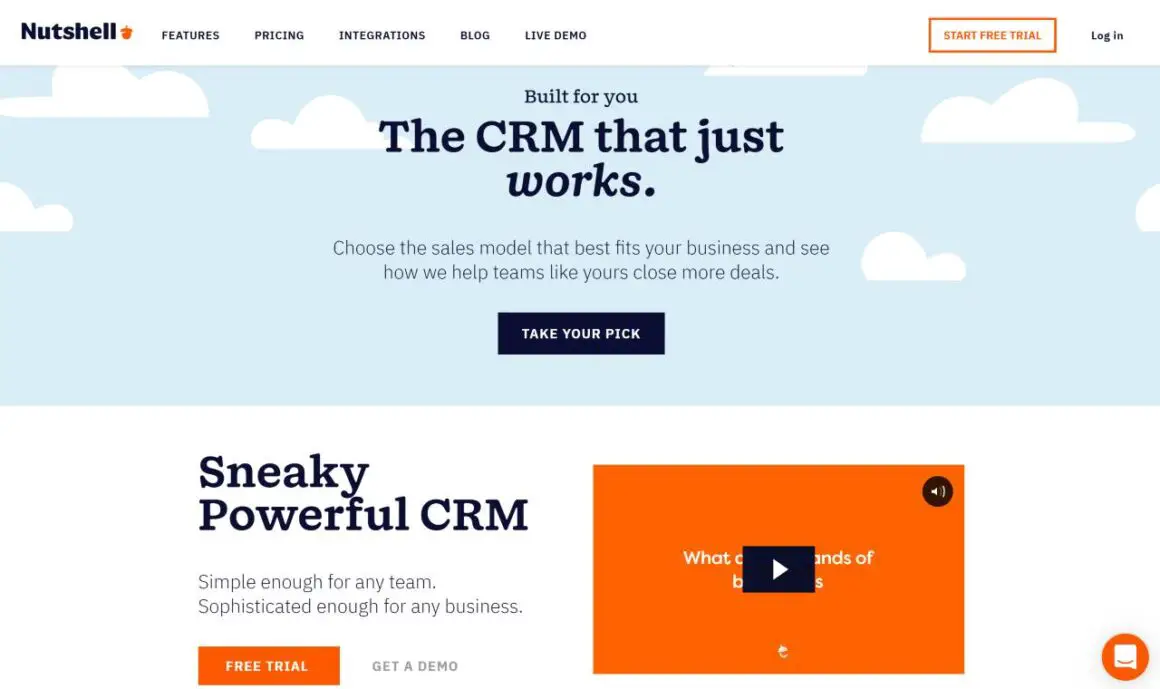
Nutshell CRM is a comprehensive, cloud-based software aimed at providing solutions to a multitude of business process problems. It is a holistic tool capable of handling all facets of a business CRM and great for keeping detailed records. It uses an Amazon Web Services (AWS) platform.
Key features
- Contact Management – Import, export, and manage all your contacts to get started immediately (automatic contact sync, centralized database, business card scanner, intelligent search function).
- Extensive Integrations – Cancels out the need for an IT department by offering various third-party integrations like Mailchimp, Constant Contact, Intercom, Slack, Outlook, and more.
- Reporting & Performance Tracking – Instant insight into your sales performance by drilling down by product, representative, lead source, and more (sales report, forecast report, loss report, activity report, funnel report, dashboards).
- Sales Automation – Automate most processes with powerful tools for maximum efficiency.
Pros
- 14-day free trial.
- Ability to send bulk emails.
- Compatible with mobile devices.
- Easy data import & export.
- Immense customer support via phone, email, live support, and tickets
- Provides a highly collaborative environment.
- Ensures data security, data integrity, and regulatory compliance (GDPR compliant). Highly scalable and customizable.
- Payment card industry (PCI) compliant to protect billing information.
- Cloud-hosted (inexpensive and easy to deploy).
- Comprehensive pipeline management (drag-and-drop board view, list view, chart view).
- Provides continuous backups by taking snapshots twice-daily, weekly, and monthly.
Cons
- Only English is supported.
- Doesn’t offer on-premise deployment.
- Pricing plans do not include any freemium plan.
Pricing Plans
Nutshell CRM provides two plans. The first one is the ‘Starter’ plan $19 per user per month, and then you have the ‘Pro’ plan for $19 per user per month (billed annually).
9. Insightly
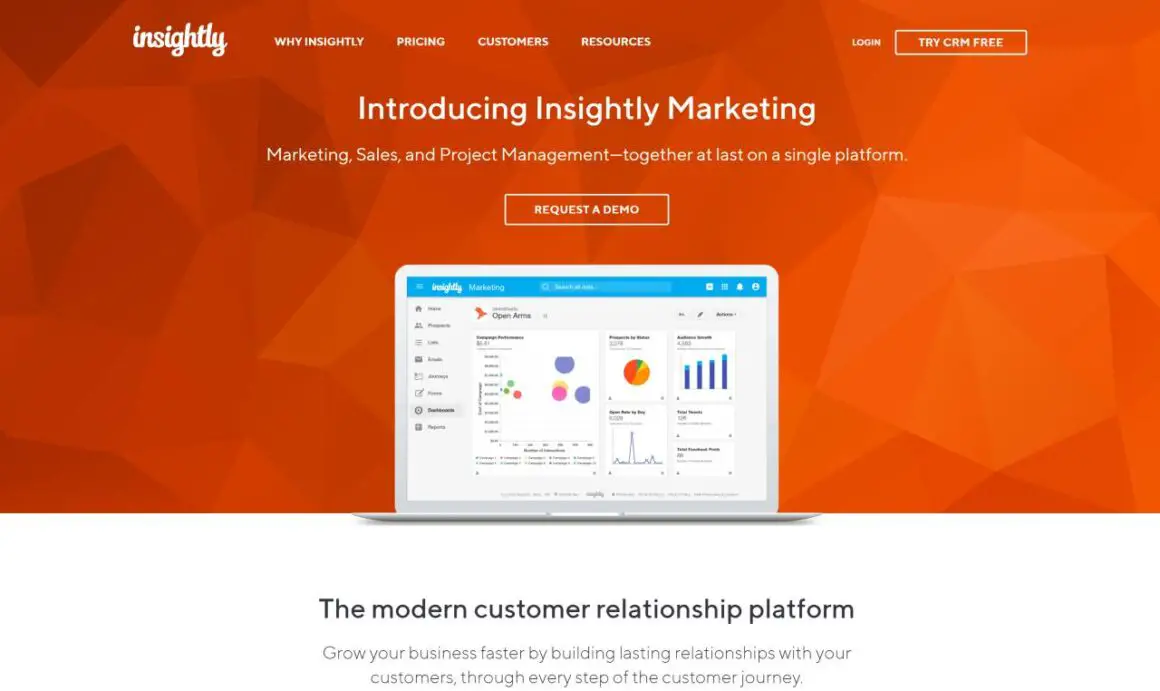
Insightly is an up to date CRM platform that can help you grow your business swiftly by building long-lasting relationships with customers.
- Pipeline Management – This allows you to examine the performance of the sales team, track sales pitch, and identify where it is precisely in the sales funnel.
- Lead Routing – Tracks the most suitable lead information including a rich activity timeline of marketing campaign source, email, phone calls, meetings.
- Extensive Third-Party Integrations – Integrated with a wide range of applications like Gmail, Dropbox, Mailchimp, Outlook, and so on.
- Relationship Management – Enables you to build strong relationships with existing customers and get new customers.
Key Features
- 14-day free trial.
- User-friendly and intuitive.
- Compatible with mobile devices, both Android and iOS.
- Offers visual dashboards for display and tracking important metrics.
- Ensures data integrity (military-grade AES-256 encryption) and regulatory compliance (GDPR-compliant).
- Very adaptable calendaring and events.
- Provides features to ensure effective filtering and tagging possible.
- In-built automated email reminders and tracking.
- In-built tutorials for hands-on experience working with the software.
- Customer support available via phone, tickets, and email.
- One of the most inexpensive software solutions.
- Get a real-time macro/micro view of your business.
- Very scalable and customizable.
Cons
- English is the only language supported.
- Live chat support and on-premise deployment is absent.
Pricing Plans
The prices begin from $29 and go up to $99 per user per month (billed annually). Insightly also offers a free plan for up to 2 users.
10. EngageBay
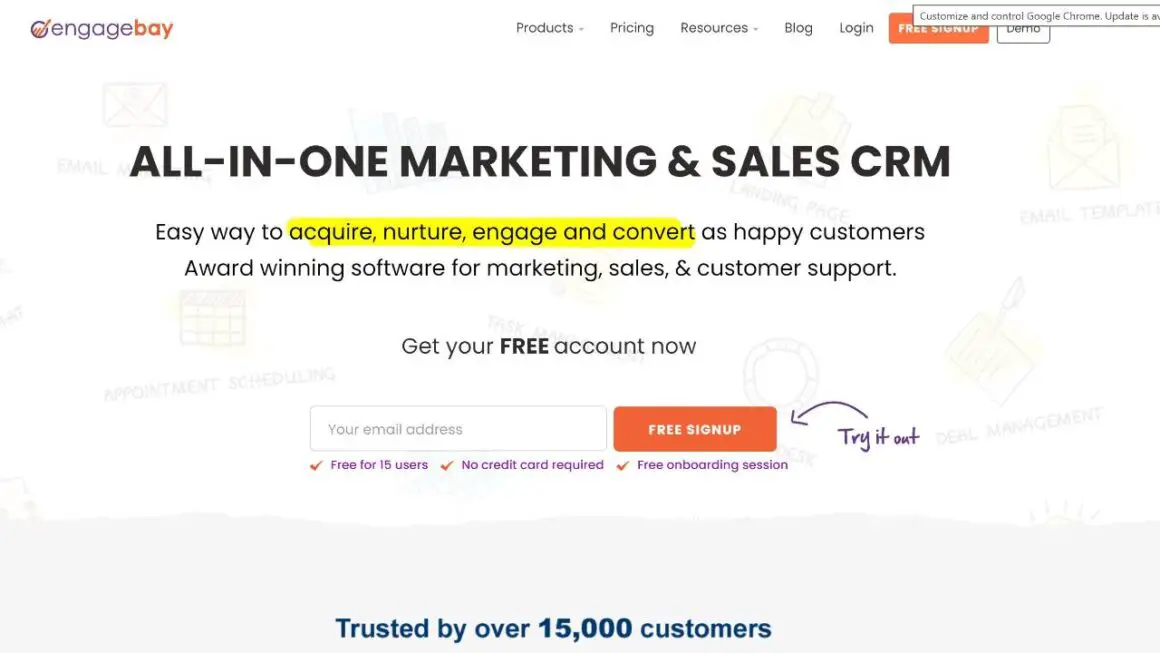
This is a cloud-hosted CRM that combines all business processes and functions like marketing, sales, and finances on to a single platform. On top of that, the software primarily focuses on automation for maximum efficiency.
Key Features
- Email Marketing – Provides a great module, combined with features like A/B testing, auto-responders, event-triggered emails, CAN-SPAM compliance, dynamic content, and more.
- Social Media Marketing – You can perform analytics, multi-account management, contact management, automated publishing, and content management.
- Lead Generation – Effective lead generation with characteristics like contact import and export, lead capture, database integration, nurturing, scoring, segmentation, and so on.
- Marketing Automation – Provides customizable CTAs, sales intelligence, website visitor tracking, drip campaigns, and many more.
Pros
- Offers a great free plan.
- The free trial period for paid plans is available.
- User-friendly and intuitive interface.
- Extensive third-party app integrations, like Zapier, Xero, and more.
- Very customizable and scalable.
- One of the most affordable plans in the market (entirely cloud-based).
- Ensures data security, integrity, and regulatory compliance (GDPR-compliant).
- Real-time, consolidated customer information for all (including previous interactions and purchases).
- Variety of forms and pop-ups for visitor engagement and lead generation.
- Comprehensive customer support via phone, tickets, live chats, email.
Cons
- On-premise deployment isn’t offered.
- Supports only English software.
Pricing Plans
It has four broad sections:
- All-in-one
- Marketing
- CRM & sales bay
- Service Bay
The CRM & sales bay segment has four plans (one free and three paid).
The paid plans start from $7.79 and range up to $29.99 per user per month, based on features (when paid bi-annually). You can also pay monthly or annually.
11. PipelineDeals
PipelineDeals is an intuitive, cloud-hosted, all-in-one CRM software that is perfect for small and medium businesses. It has excellent characteristics with a focus on sales and employee empowerment.
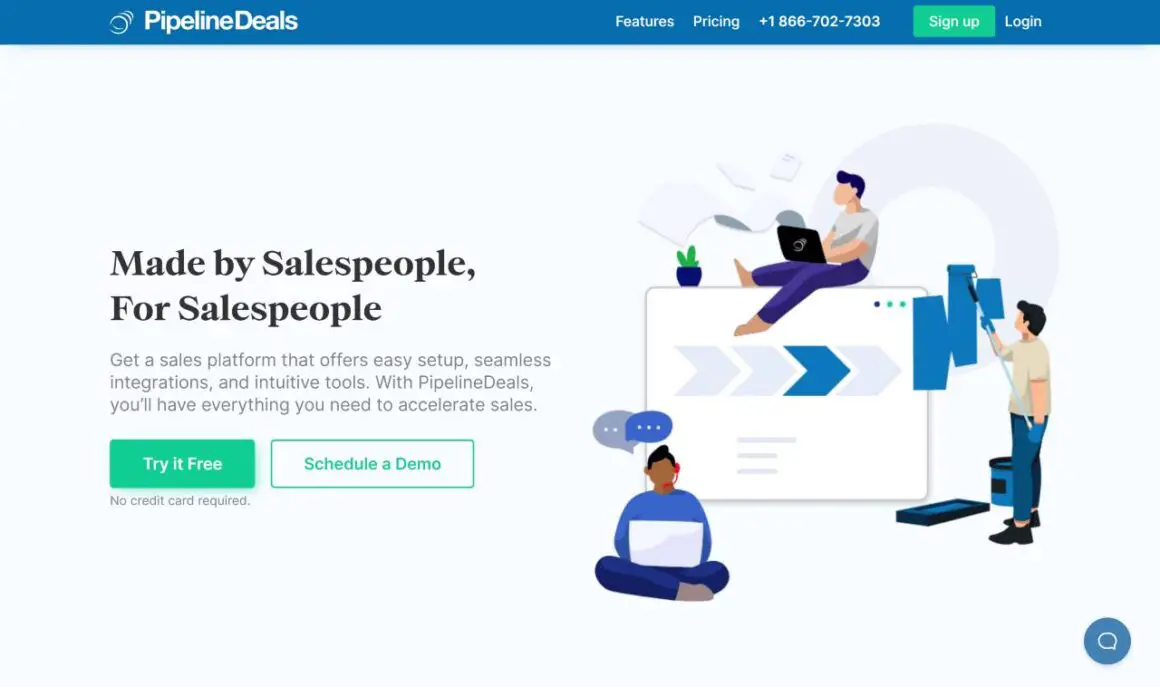
Key features
- Lead Management – Identify, track, follow up and nudge the leads that are most likely to be converted (into sales) along the sales funnel.
- Contact Management – Assists you to build new relationships with prospective leads and follow up on existing customers.
- Sales Pipeline Management – This allows you to visualize, optimize, and understand your sales pipeline for maximum efficiency
- Sales Team Management – Sets meaningful targets and establish team activity tracking. Moreover, it helps you eliminate delays, redundancies, and confusion by organizing team knowledge and providing a framework for collaboration
Pros
- Works on mobiles (iOS and Android).
- Extensive customer support via phone, tickets, email, and live support.
- 14-day free trial period.
- Infinite deals, stages, companies, and contacts.
- Unlimited file storage.
- It is inexpensive and easy to set up, since it is cloud-hosted.
- High scalability and customizability.
- In-built foreign currency tracking (any market or local currency).
- In-built email acceleration, which helps you track click-through rates, open-rate, and downloads.
- Easy to import/export data (Excel or other CRM).
- Enables you to develop dashboards for real-time visualization.
- Extensive third-party integrations (Excel, Outlook, Mailchimp, Zapier, and more).
- Comprehensive data analytics and campaign management for actionable insights
Cons
- There is no on-premise deployment.
- No freemium plan is offered.
- Only English is supported
Pricing Plan:
The paid plans start from $25 and range up to $49 per month.
12. AgileCRM
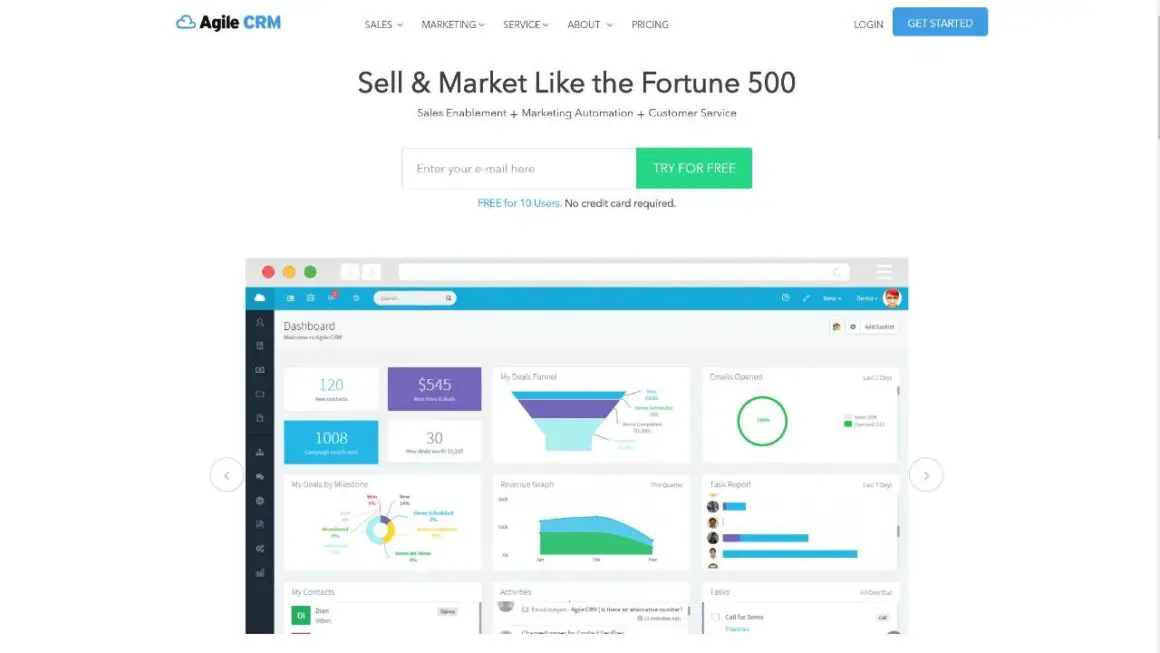
Agile CRM is an all-in-one CRM with an emphasis on automation of your marketing and sales while combining them on to one platform. It is one of the most affordable software around and also a cloud-based SaaS service
Key features
- Project Management – Efficient management of all projects on the same platform with features like drag-and-drop task lists and more.
- Contact Management – Effective single page management of contacts can help you close more deals.
- Email Marketing – Create and send professional emails, newsletters, personalize them, and track & analyze results.
- Appointment Scheduling – You can share your calendar online & automate scheduling, invites, and follow-ups
Pros
- A free plan for up to 10 users is offered.
- Cloud-based (inexpensive and easy to set up).
- Offers mobile marketing to send out personalized SMS and use mobile messaging in campaigns.
- Offers multi-chat windows, easy data entry, and workflow automation.
- Extensive third-party integrations with social, email, billing, and customer support apps.
- Built-in auto-responders.
- Extensive customer support via phone, email, live chats, and tickets.
- Highly scalable, customizable, and user-friendly.
- Comprehensive email tracking to help you gain much-needed insights into your email marketing campaign.
- The “telephony” feature lets you enjoy one-click calling, call scripts, and voicemail automation.
- Assists you in creating dynamic landing pages to attract and engage potential leads.
- Offers excellent exit intent pop-ups (convert abandoning visitors using them)
Cons
- Supports only English.
- Absence on-premise deployment.
- 24/5 customer support (not 24/7)
Pricing plans
Agile CRM is a free plan with restricted features. There are three paid plans starting from $8.99 and ranging up to $47.99 per user per month.
Other CRM worth mentioning include Netsuite, SugarCRM, SAP, and Microsoft Dynamics CRM.
Frequently Asked Questions
What is CRM Software?
Customer relationship management (CRM) software is a type of online tool that helps organizations manage a sales pipeline all the way from lead generation to closing sales.
CRMs assist companies in accessing, organizing, and making sense of customer data to generate more sales.
CRM collects information from diverse channels like phone calls, social media, feedback forms, email campaigns, live chat, personal interaction, and more. It further leverages data analytics to analyze the customer’s buying history, patterns, and needs.
The goal is to enhance the customer experience and customer satisfaction, turning leads into customers, then nurturing and upselling that relationship.
CRM has been around for a long time (earlier in paper form), but the benefits of CRM systems became known after widespread digitalization.
CRM systems link various departments, including sales, customer service, IT, marketing, HR, business intelligence (BI), and finance. Furthermore, data is readily accessible by any employee in real-time, which empowers teams to quick, data-driven decisions.
Overall, CRM solutions have managed to bring together interdepartmental teams and increase sales while removing business silos.
What should you look for in CRM software?
When choosing your web-based CRM software, here are the top 10 things to look for:
1. Product mobility
Does the CRM offer usage across different devices, since sales teams are on the move? Check to see if your CRM can be used on not only computers, but also mobile devices and tablets.
2. Integrations
A good CRM software should be able to other popular tools the company may already be using or plan to use.
3. Analytics and reporting
Most CRM platforms have in-built reporting capabilities and pre-designed reports. Check for live and dynamic reporting characteristics.
4. Sales and lead management
A good CRM should generate leads from inbound marketing, email signups, sales calls and more. Your CRM should nurture your leads through the entire sales pipeline, from lead generation to closing sales.
5. Implementation
The product implementation period should be relatively quick, error-free, and cheap. Ask your support engineer how long the timeline is and what resources are required from your team.
6. Security
File storage and platform security are important when selecting your CRM. Since your CRM is integrated with so much important data, make sure your platform’s security is top notch.
7. API calls
Your CRM should have an extensible, robust, and open architecture for custom data integrations.
8. Project management workflows
Task management boards and approval checklists should assist your sales teams to manage their tasks efficiently.
9. User experience is key
How easy-to-use is your CRM? Remember UX and make sure that your team is at ease working with this tool for the long haul and there is a short learning curve.
10. Marketing
A good CRM software should have built-in marketing tools like email pipelines, databases, and social media integration. These features help with marketing and sales alignment.
Questions to ask when choosing CRM software
- How many user seats are provided and are there user minimums?
- Is the API accessible?
- Would it be easy to train employees?
- What type of security features are standard in the software?
- Is this manufactured for small business or enterprise?
- Are there set up fees and what is the total cost?
- Does this software integrate with the tools I’m already using?
What are the benefits of CRM software?
Below are some of the benefits of using a good CRM for businesses of all sizes:
1. Save costs in the long run
Setting up a CRM software can be expensive, but it is a one-time cost. On the other hand, collaboration and enhanced operational efficiency can lead to increased results, which lowers in the long run.
2. You can cross-sell and up-sell
You can easily suggest the purchase of complementary products with the knowledge about customer choice and preferences. In addition, you can recommend other value-added versions of the product(s) that are pricier than the one your customer has bought.
3. Improved client relationships and customer interactions
CRM software permits you to streamline customer information and can also help you to serve your clients better through generated insights.
4. Increases employee involvement
Employees feel empowered when they can access data, and it results in employees taking more ownership in daily works. Thus, CRM solutions naturally increase employee participation.
5. Improves collaboration
Every member of the organization can access the same data in real-time, which can lead to enhanced collaboration between members of the team, as well as between the different sales and marketing teams involved.
6. Enhanced efficiency
Since you are private to information like customer preference, choice, and purchase history, the client doesn’t need to spend time trying to explain their requirements. You can capitalize on your knowledge, satisfy the customer, and boost work efficiency.
How do you use CRM software?
CRM software is easier to use, especially when you think about the benefits connected with it. For best results, you need to make use of it in all levels of your organization.
Here are some steps on how to use a CRM:
1. Add sales representatives
Before you include anyone else, make sure you get your salespeople on board since they’re essential for your CRM tool. Your sales team will eventually gather in the revenue, and CRM is important for them to get more sales for the business. That’s why you also need to make sure that they find it easier to use.
2. Segment your audience
Every business is diverse, and there are different ways a company can segment their sales funnel. The most commonly used system is by dividing your prospective customers into various phases like ‘lead,’ ‘opportunity,’ and ‘customer,’ which represents them from a company viewpoint.
3. Import your contact list
While many small businesses use various CRM systems for different uses, it’s a good practice to use a single one. However, whether or not you’re using a single CRM, you’ve got to import your data like the past deals, contact list, and other customer information. Almost all of the CRM systems tools allow CSV file uploads.
4. Third-Party integrations
The main point of a CRM is to concentrate on the customer data and details through as many channels as possible. Therefore, you need a CRM software that provides abundant third-party integrations. Some of the essential integrations that you should be looking at are Twitter, Amazon, Facebook, Instagram, Alibaba among others.
5. Create a dashboard
CRM systems can make things easier for you by creating a dashboard. A dashboard displays everything on its screen so you can control them. It’s basically a visual, central control panel where you have access to all the functions of your business, and control anything you want at any time.
6. Create reports
The sales team makes money for the company. That’s why it is important that you provide them with as much information as possible, which will ease their job of selling the right value to the right customers.
Hence, it’s a good practice to make reports at regular intervals, like weekly, quarterly, or monthly, and send them to the sales reps.
These reports help the sales reps to:
- Evaluate their performance
- Evaluate the performance of the team
- Keep track of the targets they have achieved and the ones they’re yet to achieve
- Keep track of the comparative performance between colleagues (for bonus and incentive considerations)
The sales reps can then modify their performance accordingly.
Summary
There are several CRM tools in the market, and all of them have their own pros and cons.
For instance, Zoho makes customer relationship management software easy and fun, while Insightly helps you concentrate on the project management side of things. On the other hand, Freshsales is popular for its user-friendliness, and Nutshell is – in a nutshell, great for your sales team.
However, you know your business better than anyone, and it’s for you to decide what it needs. Look at the value you’re getting at a definite price point, and the outcome you’re expecting.
Consider things like cloud vs. on-premise deployment, features and functionality, third-party integrations, ease-of-use, pricing plans, and more. Study all the facets before choosing the perfect CRM software for your business.
Hope you enjoyed the listicle. Check out more software reviews. Do you know any great CRM software for small businesses that didn’t make the cut here? Share your comments below.
